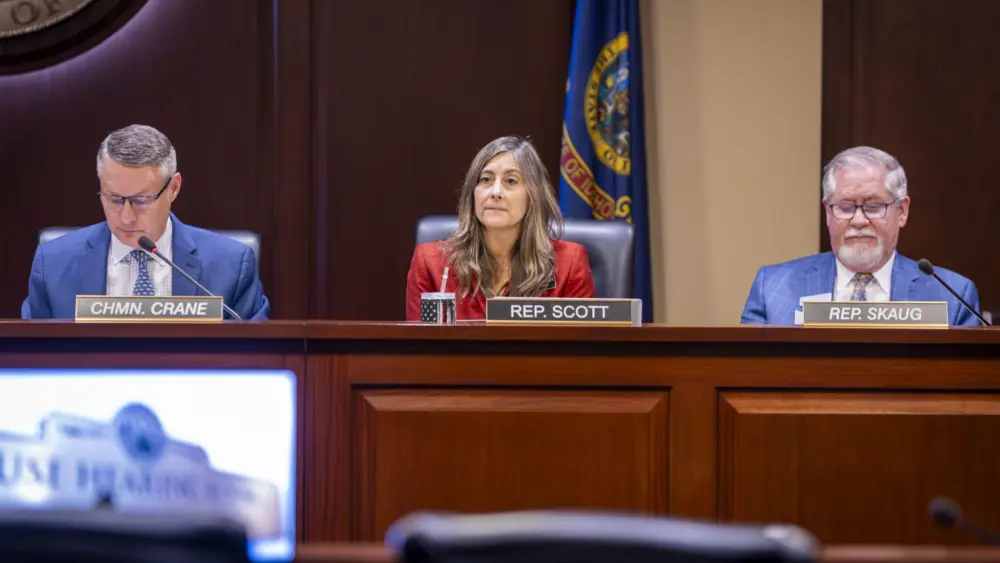SALEM, OR – An Oregon Republican and Democrat have joined forces to introduce legislation to block immigration officers and other law enforcement covering their faces, despite concerns that the untested idea would invite legal vulnerabilities for the state.
Reps. Cyrus Javadi, R-Tillamook, and Tom Andersen, D-Salem, announced Sunday that they plan to ask voters to amend the Oregon Constitution to ban what the lawmakers call “secret police,” or law enforcement officers wearing face coverings to conceal their identity. The lawmakers are planning to introduce the bill in the 2026 short session with the hopes of placing a constitutional amendment on the ballot for voters later in the year.
Oregon law already considers impersonation of a peace officer a low-level felony. In the wake of 2020’s nationwide racial justice protests, state lawmakers passed legislation in 2021 mandating that local law enforcement like sheriffs and police officers working crowds in large cities must display their first and last name along with their identifying numbers.
Sunday’s measure, however, does not delineate between local, state and federal law enforcement. It requires all officers to wear uniforms with their names and identifying badge numbers, exempting SWAT teams and undercover officers. The lawmakers say that wearing masks, as Immigrations and Customs Enforcement agents have done at recent raids, erodes trust in government, with no recourse for identifying agents conducting arrests or detainments.
“This isn’t just a thing against Democrats. This is a thing against everybody in our state, Democrats, Republicans, your political affiliation makes no difference, and no administration, by whatever stripe they are, should ever be doing this stuff,” Andersen told the Capital Chronicle.
“I don’t think there’s any disagreements that there will be challenges,” he added. “We’ll have to litigate that.”
ICE has argued during the Trump administration’s mass crackdown on illegal immigration that its officers need to mask in order to do their jobs and avoid harassment. The U.S. Department of Homeland Security reported a 830% increase in assaults toward officers in July, saying agents’ family members were doxed and targeted in the Portland area. The agency’s leadership has stood by allowing officers to mask despite growing criticism from immigration activists and law enforcement watchdogs.
The Oregon proposal would likely increase civil liabilities for law enforcement, a softer approach than taken by state legislatures in California, Michigan, Tennessee and New York, which are currently considering making masking for law enforcement a misdemeanor. U.S. Sen. Ron Wyden, an Oregon Democrat, introduced federal legislation in July prohibiting immigration enforcement officers from using face coverings and establishing an internal disciplinary process for violations.
“Battling these authoritarian acts by Donald Trump and his minions in our communities demands pushback on every level,” Wyden said in a statement. “I’m gratified to see these two Oregon legislators spotlighting this issue at the state level with a bipartisan lens that reflects the best of the Oregon Way.”
But legal experts are debating the viability of the state-level measures, and whether states’ right to ensure the welfare and safety of their citizens can override the U.S. Constitution. The Constitution’s supremacy clause ensures federal law takes precedence over state law.
Other more legally viable options for states include allowing local law enforcement to verify federal agent identities or conditioning cooperation upon not wearing masks, according to Noah Chauvin, an associate professor of law at the University of Oklahoma College of Law. Oregon’s sanctuary law already prohibits state and local law enforcement from helping enforce federal immigration law without a court order.
“If it makes it a crime or otherwise prohibits federal law enforcement from wearing masks when doing their normal operations, then that’s going to have supremacy clause problems, because it’s going to be a direct regulation of the manner in which the federal government is pursuing its mission,” Chauvin said.
Andersen said he was willing to consider making changes to state law and cooperation with federal authorities as a potential alternative but stressed the importance of challenging the Trump administration’s immigration policy. In Beaverton, for instance, masked ICE agents apprehended a father outside of his children’s school in late July, aligning with a recent shift from longstanding federal policy preventing immigration enforcement in churches, schools and hospitals.
“We need to be aware of the atrocities that are happening in our country, and we need to stand up against it,” Andersen said. “This is the first set on a slippery slope, and the less we resist and stand up, the more the bullies will take over.”
The homeland security department did not immediately respond to requests for comment about the legislation. In a June post on X responding to a similar bill in California, the agency called the effort “despicable.”
“While ICE officers are being assaulted by rioters, a sanctuary politician is trying to outlaw officers wearing masks to protect themselves from being doxed and targeted by known and suspected terrorist sympathizers,” the department wrote.
How the agency may respond to the proposed bill if it were passed remains a question. Chauvin said the U.S. Attorney’s Office could remand state cases involving federal employees to federal court, moving to dismiss them on the grounds of preventing conflicts through the supremacy clause.
“Conceivably, you could see the federal government, if this were enacted, challenging in court,” he said. “I think, more likely, they would just ignore it.”
Constitutional amendments in Oregon require majority votes in both the House and Senate to receive a public vote on the ballot. If the legislature passes Javadi and Andersen’s proposal in the 2026 short session, it will be referred to voters on the 2026 general election ballot. It would require a simple majority of voters to pass.
Oregon Capital Chronicle is part of States Newsroom, a nonprofit news network supported by grants and a coalition of donors as a 501c(3) public charity. Oregon Capital Chronicle maintains editorial independence. Contact Editor Julia Shumway for questions: info@oregoncapitalchronicle.com.





